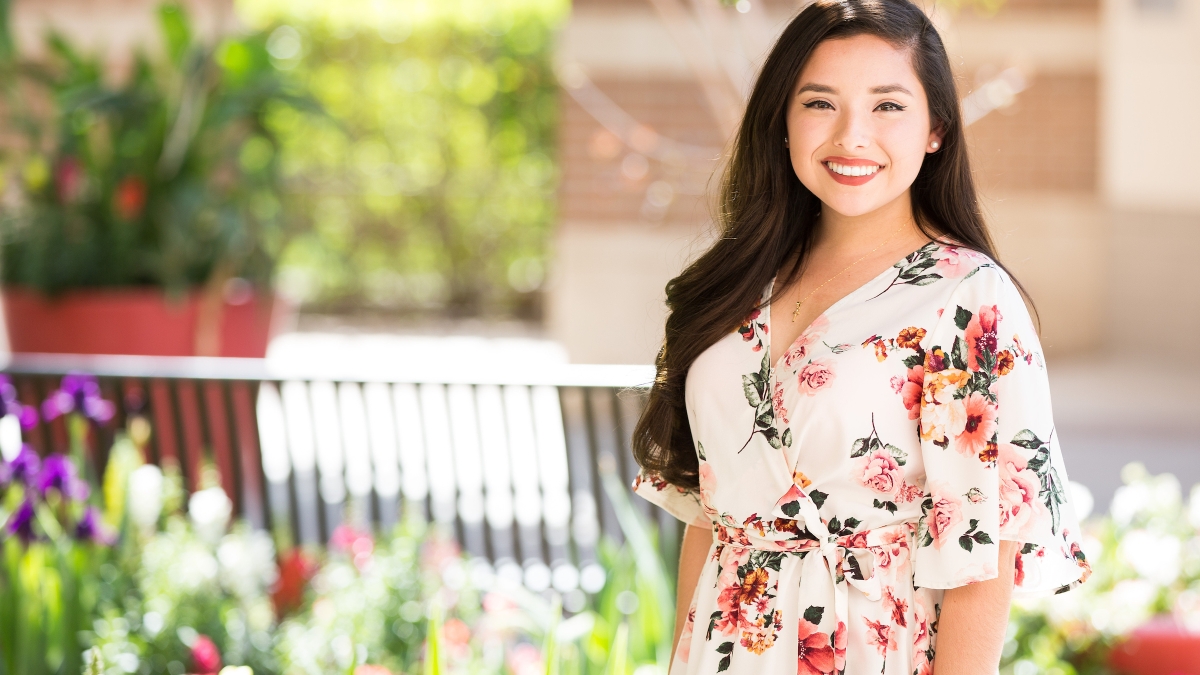Editor’s note: This is part of a series of profiles for spring 2018 commencement.
Ask Lilianna Valdivia where her ambition came from and her eyes light up.
“My mom,” she says with a smile.
Born and raised in Peoria, Arizona by a single mother, the Barrett, The Honors College student and Hispanic Honor Society member is a first-generation college student who relied on scholarshipsLilianna Valdivia is the recipient of the Sun Devil Family Association Scholarship and the Medallion Scholarship., the support of her family and her own determination to get where she is today.
“I’m very family-oriented; my family are my biggest supporters,” Valdivia said. She credits her mother with pushing her to pursue higher education and instilling in her the idea “that education was something that no one could take away from me.”
This spring, Valdivia will graduate from Arizona State University with a bachelor’s degree in forensic science. She is hoping to be accepted to the master’s program in forensic psychology at ASU, and is being considered for a crime scene technician position by the city of Phoenix.
Valdivia’s interest in the subject began in high school when she took a law enforcement class and the instructor encouraged her to apply for an internship with the city of Peoria. She got it, and soon found herself in a real crime lab, getting hands-on experience.
“It’s really cool to think about the impact my work has on my community and how vital my job is to the criminal justice system,” Valdivia said.
Question: What’s something you learned while at ASU — in the classroom or otherwise — that surprised you, that changed your perspective?
Answer: I’m currently finishing up my thesis project about Latino women in STEM, and I dive into the experiences of multiple women in STEM. A lot of the women here, including myself, had to battle or overcome certain barriers, being female or being a woman of color in the sciences. One thing that surprised me is that while I was pursuing this topic, even being in the midst of hearing about all these struggles, I learned that there are so many wonderful administrators, faculty members and students that really do care about what other people are going through and want to do everything they can to make sure everyone has the best higher education experience possible.
Q: Why did you choose ASU?
A: I got a decent amount of scholarships and it was really one of the only universities that caught my attention for the forensic science program. It’s also pretty close to home, and I’m very family-oriented; my family are my biggest supporters. And I really like the West campus because it’s smaller, so it has a great sense of community, and it’s really beautiful here.
Q: What’s the best piece of advice you’d give to those still in school?
A: Be open-minded. Because ASU is so huge, you have the opportunity to meet so many new people and to make so many different friends. When you just stick to one group the whole time, you kind of miss out on what you could be learning and experiencing, and you might find something that you’ll like and it’ll surprise you. So just be open-minded to new things.
Q: What was your favorite spot on campus, whether for studying, meeting friends or just thinking about life?
A: The Kiva fountain. Whenever I got stressed out or I needed a place to chill out and listen to music, I’d (go there) and dip my feet in the fountain and just hang out.
Q: What are your plans after graduation?
A: I applied to the master’s of forensic psychology program at ASU because I want to work in a crime lab. I think eventually, in the future, I’d like to become a professor. Since being at ASU, I really see that teachers have an impact on the students’ experiences and how successful they are, and I’d like to be able to help in that way, too.
Q: If someone gave you $40 million to solve one problem on our planet, what would you tackle?
A: I think I’d try to provide more resources for students from other countries who want to immigrate here to get a better education. I know there’s a lot of controversy around DACA and that sort of thing. But I think that every student who wants to get a higher education and expand their mind should have the opportunity to do so, regardless of their gender, sexuality, socioeconomic class or race.
Top photo: Forensics graduate Lilianna Valdivia poses for a portrait in the Kiva courtyard at West campus on April 6. Photo by Deanna Dent/ASUNow
More Science and technology

CSI: Mars
By Wendee NicoleTravelling to Mars has loomed large in the public’s imagination since at least the late 1800s when H.G. Wells' “War of the Worlds” tale of a Martian invasion was serialized in print.…

ASU research is helping solve crimes
On TV, detectives solve crimes in 43 minutes (plus commercial breaks). In real life, it takes much more time — and many more minds, including researchers discovering new ways to analyze evidence and…

Compact X-ray laser lab aims to reveal deep secrets of life, matter and energy
X-rays allow us to view inside the human body to diagnose broken bones and other hidden problems. More recent X-ray advances are making it possible to see events at the scale of atoms and molecules,…


